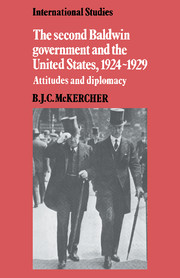Book contents
- Frontmatter
- Contents
- Acknowledgements
- List of abbreviations
- 1 THE SECOND BALDWIN GOVERNMENT AND THE UNITED STATES, NOVEMBER 1924–JUNE 1929
- 2 FOREIGN OFFICE PERCEPTION OF REPUBLICAN FOREIGN POLICY, NOVEMBER 1924–MAY 1927
- 3 THE ONSET OF NAVAL DEADLOCK, JUNE–AUGUST 1927
- 4 BELLIGERENT VERSUS NEUTRAL RIGHTS, AUGUST–DECEMBER 1927
- 5 THE PACT TO RENOUNCE WAR, JANUARY–JULY 1928
- 6 ARBITRATION, BELLIGERENT RIGHTS, AND DISARMAMENT, JANUARY–JULY 1928
- 7 THE CRISIS IN ANGLO-AMERICAN RELATIONS, AUGUST–NOVEMBER 1928
- 8 THE AMERICAN QUESTION RESOLVED, NOVEMBER 1928–JUNE 1929
- Notes
- Bibliography
- Index
5 - THE PACT TO RENOUNCE WAR, JANUARY–JULY 1928
Published online by Cambridge University Press: 10 November 2009
- Frontmatter
- Contents
- Acknowledgements
- List of abbreviations
- 1 THE SECOND BALDWIN GOVERNMENT AND THE UNITED STATES, NOVEMBER 1924–JUNE 1929
- 2 FOREIGN OFFICE PERCEPTION OF REPUBLICAN FOREIGN POLICY, NOVEMBER 1924–MAY 1927
- 3 THE ONSET OF NAVAL DEADLOCK, JUNE–AUGUST 1927
- 4 BELLIGERENT VERSUS NEUTRAL RIGHTS, AUGUST–DECEMBER 1927
- 5 THE PACT TO RENOUNCE WAR, JANUARY–JULY 1928
- 6 ARBITRATION, BELLIGERENT RIGHTS, AND DISARMAMENT, JANUARY–JULY 1928
- 7 THE CRISIS IN ANGLO-AMERICAN RELATIONS, AUGUST–NOVEMBER 1928
- 8 THE AMERICAN QUESTION RESOLVED, NOVEMBER 1928–JUNE 1929
- Notes
- Bibliography
- Index
Summary
I can form some opinion as to what France or Germany or Italy may be likely to do in this or that contingency. Except in a narrow field the course which will be taken by the United States is a riddle to which no one – not even themselves – can give an answer.
Chamberlain, July 1928On 6 April 1927, the tenth anniversary of the American entry into the Great War, Aristide Briand announced to the press that his government was willing to conclude an agreement with the United States that would renounce war ‘as an instrument of national policy’ in Franco-American relations. The Coolidge Administration did not receive formal notification of Briand's proposal until late June 1927, when the American ambassador at Paris, Myron Herrick, brought the suggested text for a renunciatory pact to Washington during his annual holiday. There was no official American reply until 28 December 1927, when Kellogg informed Paul Claudel, the French ambassador at Washington, that the Coolidge Administration could not entertain the idea of a bilateral Franco-American renunciatory pact.
Kellogg followed this with an interesting diplomatic counter. The existing Franco-American arbitration treaty, concluded in 1908 under the guidance of the then American secretary of state, Elihu Root, was about to lapse. Kellogg tied together the two ideas of international arbitration and a political instrument to renounce the resort to war in international politics.
- Type
- Chapter
- Information
- The Second Baldwin Government and the United States, 1924–1929Attitudes and Diplomacy, pp. 104 - 127Publisher: Cambridge University PressPrint publication year: 1984

